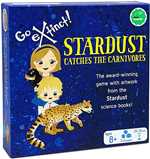
Go Extinct! Stardust Catches The Carnivores Board Game
Go Extinct! Stardust Catches the Carnivores is a new special edition of the award-winning Go Extinct! tabletop card game, incorporating artwork and concepts from the Stardust series of science books for young readers.
Players complete sets of animals based on actual genetic clades, working to collect the most sets by inferring the other player's cards and identifying common ancestors on the evolutionary tree. By the end, players will deeply understand the amazing fact that every carnivoran alive today - from the house cat to the polar bear - descended from a single prehistoric ancestor, the miacid!
Based loosely on Go Fish, the goal is for players to collect as many sets of closely related animals as possible. The sets are "clades" of closely-related animals on the evolutionary tree board, which players use for reference. Players take turns asking another player for cards, and if they do not have a matching card, they say "Go Extinct!". The gameplay is more strategic than Go Fish because players can ask either for a specific card or a matching card at any level of the tree hierarchy, thus trading off the specificity of the result for the likelihood of a match.
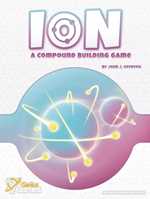
Ion Card Game: 2nd Edition
Each player is initially dealt eight cards. They choose one card and pass the remaining to the player on their left, while they receive the same amount of cards from the player on their right (this is commonly referred to as 'card drafting' or 'pick and pass').
Selected cards must be either (1) bonded to another ion or (2) set alone. Players only score points for neutrally balanced cards. So a positive charged Sodium (Na+) bonding with a negatively charge Chloride (Cl-), forming a neutral NaCl compound, would score points.
Points are scored at the end of each round and player may gain additional points for building specific compounds listed on the goal cards for that round. After three rounds the player with the most points wins!

Math Rush Card Game: Fractions Decimals And Percent
Think fast in Math Rush, a totally thrilling cooperative math game that will make your heart race and your head rev. For three rounds, up to five players must balance strategy and speed, properly sequencing fractions, decimals, and percents before the timer runs out. Crunch the numbers in a hurry and rack up more points; make an error and miss your goal. Whether you beat your high score or not, it's more fun that you calculated.
Math Rush is a timed, co-operative card game for 1-5 players who race to complete sets of matching cards in the right order. In Math Rush: Fractions, Decimals, & Percents, the cards show fractions, decimals, and percents that must be played in ascending or descending order, meeting the requirements of the goal cards (such as "Decimals Only").
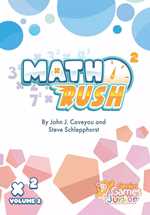
Math Rush Card Game: Multiplication And Exponents
Think fast in Math Rush, a totally thrilling cooperative math game that will make your heart race and your head rev. For three rounds, up to five players must balance strategy and speed, properly sequencing products and exponentials before the timer runs out. Crunch the numbers in a hurry and rack up more points; make an error and miss your goal. Whether you beat your high score or not, it's more fun that you calculated.
Math Rush is a timed, co-operative card game for 1-5 players who race to complete sets of matching cards in the right order. In Math Rush: Multiplication & Exponents, the cards show products and exponentials that must be played in ascending or descending order, meeting the requirements of the goal cards (such as "Perfect Squares Only").
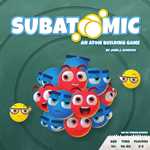
Subatomic Card Game
Subatomic is a deck-building game about building elements from subatomic particles!
Players begin the game with a small deck of quarks and photons. Each turn, players draw a new hand of cards and decide to either build up their atom to score points, or buy stronger cards for their deck.
Players use their quarks and photons to build protons, neutrons and electrons. They then decide to either:
Players may also 'hire' famous scientists like Marie Curie, Niels Bohr, Maria Goeppert-Mayer and Albert Einstein. Players use scientists to break the standard rules of the game, like turning energy into matter and replicating cards played by other players! Subatomic is easy to learn, but exciting to master and encourages strategic timing and optimizing available resources.
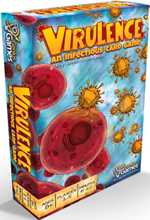
Virulence Card Game
Take on the role of a virus competing to infect a host cell and replicate your viral components! Virulence is addictively simple, highly competitive, and can be taught in only minutes!
Each round, you secretly choose one Virus Card from your hand, place it face down on the table, then simultaneously flip to reveal your Virus' virulence number. In order from highest to lowest virulence, everyone takes a turn selecting from the available Viral Components Cards, which score points in a number of way. Whoever has the most points at the end of the game wins!






